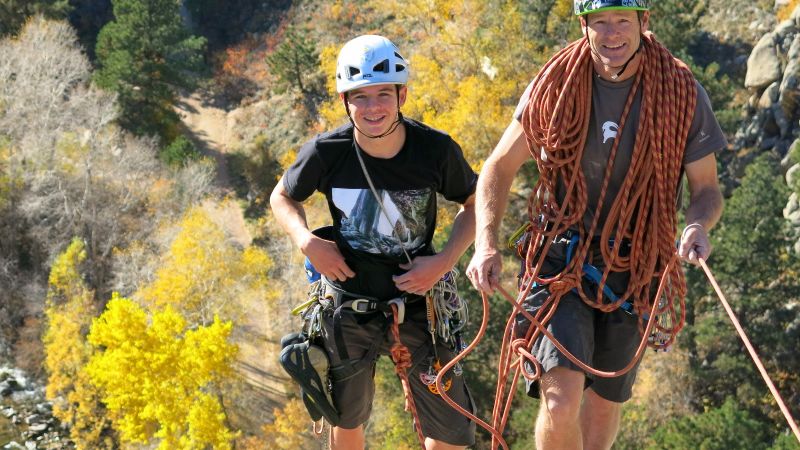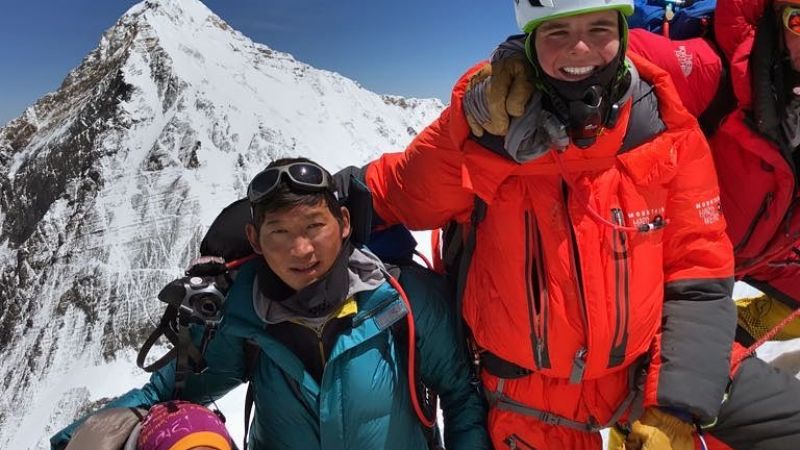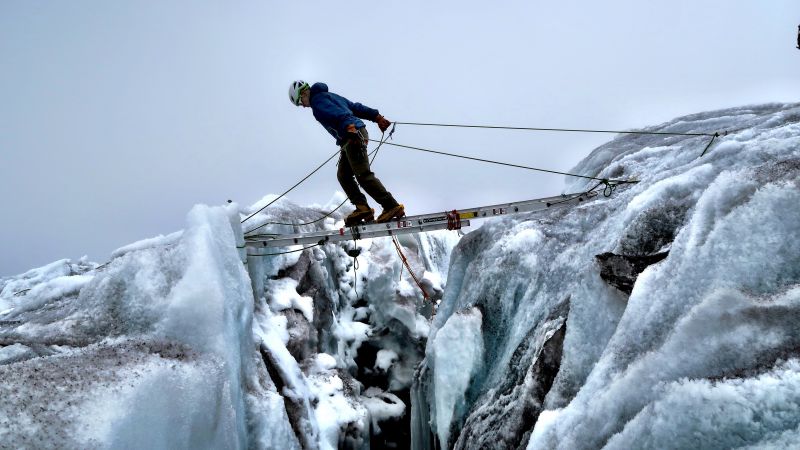What to look for in a rock or alpine climbing, backcountry skiing, or general mountaineering mentor. Find the best mentor and fit for you.
By Owen Clarke
Owen Clarke is a freelance outdoor and travel journalist specializing in mountaineering.
Have you been caught up in the recent climbing craze, spurred on by films like The Alpinist and Free Solo? Or maybe you’ve always wanted to explore the high places of the planet, but just aren’t sure where to start.
The world’s best climbers and mountaineering guides may make tackling daunting alpine obstacles seem effortless on TV, film, and social media, but these men and women have spent a lifetime in the mountains, and every one of them was once a beginner, just like you. More importantly, almost all of them had a mountaineering mentor to show them the ropes.
Look, we get it. No one wants to be a beginner. Everyone wants to skip to the part where they’re experienced, where they can post on social media about their badass climbs and ski descents and other adventures, and not show the nitty-gritty of how they got there.
But you have to start somewhere. You can’t just walk out into the Himalaya and expect to start tackling 8,000-meter peaks. (Well, you can try, but it won’t end well.)
Stories abound of poorly guided, poorly trained individuals who end up injured or dead in the alpine. I wrote this article for Outside Online about a recent avalanche on Chimborazo (6,263 m) that killed half-a-dozen climbers, which was likely triggered by illegal guides who didn’t know how to read the snowpack. I myself was almost killed on another South American peak as a goofy college kid, trying to cut corners and get in over my head without proper training.
To put it simply, big mountain goals require big planning, big training, and big guidance.

What to Look for in a Mentor
There are three main components you need to succeed in the mountains: physical fitness, technical expertise, and the mental fortitude to back it all up.
We’ve discussed some of the physical and mental aspects (specifically relating to Everest) in another post, “How to Prepare for Climbing Mount Everest.” Generally, physical fitness and mental training aren’t something you’ll need to rely completely on your mountaineering mentor for. You can go to the gym, take long runs and hikes, and otherwise get yourself in shape on your own, and you can find the resources you need to develop your physical fitness on the web.
(Just don’t forget to train your mental fortitude, too. As Willie told the Salt Lake Tribune, “You have to be able to suffer” to climb big mountains.)
Finding a climbing mentor or backcountry skiing mentor becomes truly critical when it comes to learning the complex technical skills you need to survive in the mountains, such as how to properly tie your knots, how to lead on ice, how to identify avalanche-prone slopes, and so on.
You don’t just need a mentor with technical knowledge though. You want to look for a mentor with experience, accreditation, and character. All three are equally important and necessary.
Just because someone has spent dozens of years in the mountains doesn’t mean they’ve done so safely. I’m an avid motorcyclist, and I see riders all the time who have been riding for decades, but they don’t wear helmets or protective gear, have poor technique, drive aggressively… and are basically on the fast track to becoming a grease stain.
The same is true for mountaineering, rock climbing, and skiing.
All guides and mentors need to be certified with proper AMGA (American Mountain Guides Association) and IFMGA (International Federated Mountain Guides Associations) credentials, so always look for this when trying to find a mentor. The more years they’ve spent in the mountains, of course, the better.
Another important quality that might not be as obvious is character. Mountain sports are dangerous. There are plenty of skilled athletes who lose their cool when things get dicey, bailing on their teammates or worse.
You don’t just need a talented, experienced mentor, you need a mentor that will have your back when things go south, and who will stick with you and keep you safe in hairy conditions.
Our lead guides Willie and Damian, for example, were given the “Heroic Athlete Award” by the Argentine Olympic Committee in 2011 for their rescue of an abandoned climber on Everest and have participated in several other rescues over the years, including saving lives during the notorious 2015 Mount Everest avalanche and earthquakes.
Whether you chose to learn the ropes with us or another mountaineering mentor, it’s important to find a mentor that has good character in addition to good climbing skills.

How to Prepare as a Mentee
The best way to prepare as a mentee is to ensure your physical fitness is on par with the activities you plan to undertake, and follow your mentor’s instructions both on the mountain and off the mountain, when training on your own.
Regardless of your mentor’s guidance, it’s also important to keep your skills up and do some learning on your own.
Think about it. If you’re serious about becoming a lawyer or a doctor, you aren’t going to only think about law or medicine when you’re in class, or only do the homework your professor assigns and nothing else. You’re going to study and research on your own, too.
Below are a few great resources for beginning mountain athletes. These books will give you a good launchpad before you begin your mentorship and throughout the process.
- Mountaineering: The Freedom of the Hills
- Training for the New Alpinism: A Manual for the Climber as Athlete
- Training for the Uphill Athlete: A Manual for Mountain Runners and Ski Mountaineers
The Freedom of the Hills is a historic tome, first published over 60 years ago, and has long been considered the “Bible” of mountaineering. It’s an excellent place to start to learn the nuts and bolts of mountain sports.
Training for the New Alpinism and Training for the Uphill Athlete are newer, highly-reviewed works by renowned climber Steve House and Scott Johnston, focusing slightly more on training. The latter, as the title suggests, is more relevant for ski mountaineering and running, as opposed to climbing, and was co-written with mountain runner Kilian Jornet.
Rock Climbing, Alpine, or Ski Mountaineering Mentor?
The question to ask yourself here is simple… What do you want to learn most?
If you aren’t sure where you’d like to start, a great way to find out is to craft your own custom-guided adventure with us and find out what outdoor experiences you enjoy most, whether alpine climbing, skiing, rock climbing, or something else. Then you can decide what activities you wish to dive deeper into.
It’s important to realize, however, that you don’t have to choose just one sport to focus on! Almost all of our guides are talented skiers, mountaineers, and climbers, and mountain sports skills overlap in myriad ways.
Skiers and alpine climbers, for example, both need to know how to read avalanche danger. Meanwhile, both alpine and rock climbers will need to learn similar belay techniques and rope management skills.
So, don’t stress about only focusing on one sport. The best mountain athletes can practice a variety of mountain sports, and the best mentor won’t just be a climbing mentor, a backcountry skiing mentor, or an alpine climbing mentor… they’ll be all of the above.
Big Goals? A Mentor is Best

The point is, if you want to climb or ski big objectives, like Everest, Denali, or wilder peaks further afield, then finding an experienced mentor is the way to go. From famed big mountain skier Johnny Collinson, the youngest person to summit the Seven Summits at age 17, to Nat Geo Adventurer of the Year Matt Moniz, the youngest person to summit Aconcagua…
Willie and Damian Benegas have mentored the best of the best in their 30+ years of guiding.
Collinson did the Seven Summits with us coaching him along the way. Moniz tackled more than one 8,000-meter peak with Willie’s guidance, including Everest and Makalu.
It’s not a stretch to say that the remarkable success these athletes and others like them have achieved is largely because of their strong foundation and mentorship.
There’s no outfit out there that can offer you a more dedicated, intensive mentorship program. Take our Everest statistics, for example. Benegas Brothers Expeditions has a 100% safety rating on Everest (we’ve never had a single accident since we started guiding on the mountain in the late 1990s), which few other guiding outfits can claim. Most years, we also have a 100% success rate (meaning all clients reach the summit).
It doesn’t matter where you’re based, either. Since Willie is a full IFMGA (internationally-certified) mountain guide, he can mentor you in any country on the globe.
If you want to achieve your alpine, rock, or ski goals safely, quickly, and successfully, then you can’t do better than to learn the ropes with us.
See Willie Benegas at work here in this full episode of ESPN Adventure, “Winter in Patagonia Part 3”: